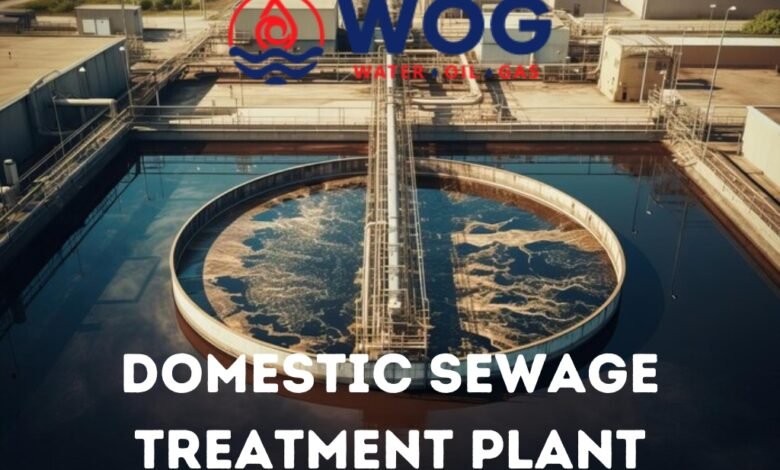Domestic Sewage Treatment Plants: Cost, Efficiency, and Maintenance Tips

Have you considered what happens to drain water?
Have you ever considered the fate of the water you pour down the drain?
In light of the increasing environmental consciousness and need for sustainable living, residential sewage treatment plants are gaining popularity as a household option. These systems offer a practical means of conserving water and safeguarding natural resources in addition to treating wastewater. We’ll explore the costs, effectiveness, and upkeep advice for domestic sewage treatment plants, making it easier for you to see why getting one could significantly improve your house. Are you prepared to improve the way you manage wastewater and help the environment?
Learning the Basics: A domestic sewage treatment plant?
Domestic sewage treatment plants are vital for treating home and small company wastewater. These plants, unlike huge municipal treatment facilities, serve individual families or small towns, making them appropriate for rural areas, suburban residences, and enterprises wishing to improve wastewater management.
Domestic sewage treatment plants break down and treat waste using natural processes. Primary treatment removes solids, secondary treatment breaks down organic materials using biological processes, and sometimes tertiary treatment purifies. After treatment, the water can be safely released or used for agriculture or industry.
Understanding these plants’ basic operation is essential for installation decision-making. Knowing how operations work and the sorts of systems available help you choose the proper setup.
Cost: Investment vs. Long-Term Savings
Cost is a major consideration for domestic sewage treatment plant buyers. Both the original investment and long-term financial effects must be considered. Installing a sewage treatment plant requires site preparation, unit cost, and installation fees.
Treatment plant prices vary by system size and type. Households cost INR 1 lakh to 5 lakhs on average. Installation can cost INR 50,000–1 lakh. This may seem large but consider the long-term savings.
On-site wastewater treatment can avoid the need for expensive sewage disposal. The purified water can also be utilized for agriculture, lowering water expenses. Eventually, these savings might offset the initial investment, making a sewage treatment facility cost-effective.
Efficiency and Performance: Expectations
Knowing a household sewage treatment plant’s efficiency and performance is vital before buying. Modern sewage treatment systems efficiently cleanse water to environmental requirements and make it safe for disposal or reuse.
Sewage treatment efficiency depends on the system’s ability to handle your household or business’s wastewater volume, the biological and chemical processes’ efficacy, and the water’s quality.
Most domestic sewage treatment plants remove organic debris and contaminants efficiently, some up to 95%. This ensures clean wastewater that meets discharge regulations. Advanced systems can also remove bacteria and nutrients, making treated water more versatile.
A system that fits your demands and usage habits is essential for best performance. Maintaining efficiency and system performance requires regular maintenance and monitoring.
System maintenance: keeping it running smoothly
Domestic sewage treatment plants need regular maintenance like any mechanical equipment. Proper maintenance increases system life and assures efficiency and reliability.
- Regular Inspections: Check for wear, leaks, and other issues with regular inspections. Minor issues can be caught early to save expensive repairs.
- Routine Cleaning: Screens, filters, and aeration equipment may need periodic cleaning to remove debris and maintain air and water flow, depending on the system.
- Sludge Management: Treatment tank bottoms acquire sludge over time. Sludge must be removed regularly to prevent overflows and maintain system capacity. Sludge removal frequency depends on system size and consumption.
- Monitor Effluent Quality: Test treated effluent regularly to maintain environmental compliance. This helps identify treatment difficulties and take immediate action.
- Professional Servicing: At least once a year, use professionals to do extensive examinations and maintenance that may go beyond normal inspections.
Follow these maintenance guidelines to keep your residential sewage treatment system running well for years.
Beyond Compliance: Environmental and Practical Benefits
Installing a domestic sewage treatment plant has benefits beyond regulatory compliance. These technologies benefit homeowners and businesses while promoting environmental sustainability.
Environmental Benefits:
- Water Conservation: Reusing treated water for irrigation reduces freshwater use. This helps in water-scarce places.
- Pollution Reduction: On-site wastewater treatment protects aquatic habitats and public health.
- Reduce Carbon: Wastewater management’s carbon footprint is reduced by modern sewage treatment plants’ energy efficiency.
Benefits in practice:
- Reuse: Reusing treated water and reducing dependency on external sewage disposal providers can save money over time.
- Property Value: A domestic sewage treatment plant shows a dedication to sustainability, which boosts property value.
- Self-Sufficiency: On-site wastewater treatment lowers municipal dependence and increases waste management control.
In conclusion
Installing a domestic sewage treatment plant is a preferred option, especially for those homes and organizations that wish to treat their waste liquid in an environmentally friendly way. If you are aware of the price for such plants, their productivity and maintenance, you will be in a position to make a decision that will be beneficial both to your property and to the environment. Such technologies are an effective means of wastewater treatment, conserving water resources and protecting the environment. A domestic sewage treatment plant will last several years if it is well maintained. This is a permanent solution for handling wastewater. You can make the planet cleaner and increase the value of your property by using domestic sewage treatment plants now. You are driven such that you wish the world to be sustainably designed, where waste management is not a problem. The Industrial Effluent Water Treatment is being addressed too, we are using wastewater treatment plants.




